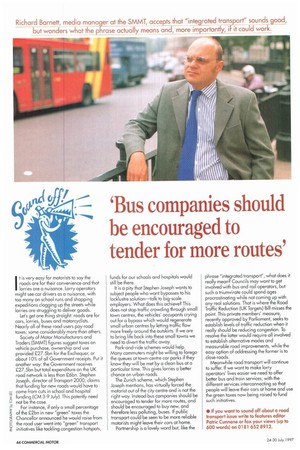'Bus companies should be encouraged to tender for more routes'
Page 46

If you've noticed an error in this article please click here to report it so we can fix it.
It is very easy for motorists to say the roads are for their convenience and that lorries are a nuisance. Lorry operators might see car drivers as a nuisance, with too many on school runs and shopping expeditions clogging up the streets while lorries are struggling to deliver goods.
Let's get one thing straight: roads are for cars, lorries, buses and motorcyclists. Nearly all of these road users pay road taxes; some considerably more than others. Society of Motor Manufacturers and Traders (SMMT) figures suggest taxes on vehicle purchase, ownership and use provided 227.5bn for the Exchequer, or about 10% of all Government receipts. Put it another way: the Government receives 227.5bn but total expenditure on the UK road network is less than 26bn. Stephen Joseph, director of Transport 2000, claims that funding for new roads would have to come from cuts in school and hospital funding (CM 3-9 July). This patently need not be the case.
For instance, if only a small percentage of the 22bn in new "green" taxes the Chancellor announced he would raise from the road user went into "green" transport initiatives like tackling congestion hotspots, Funds for our schools and hospitals would still be there.
It is a pity that Stephen Joseph wants to subject people who want bypasses to his lacklustre solution—talk to big-scale employers. What does this achieve? This does not stop traffic crowding through small town centres, the vehicles' occupants crying out for a bypass which would regenerate small urban centres by letting traffic How more freely around the outskirts. If we are to bring liFe back into these small towns we need to divert the traffic away. Park-and-ride schemes would help. Many commuters might be willing to forego the queues at town-centre car parks if they know they will be met by a clean bus at a particular time. This gives lorries a better chance on urban roads.
The Zurich scheme, which Stephen Joseph mentions, has virtually forced the motorist out of the city centre and is not the right way. Instead bus companies should be encouraged to tender for more routes, and should be encouraged to buy new, and therefore less polluting, buses. If public transport could be seen to be more reliable motorists might leave their cars at home. Partnership is a lovely word but, like the phrase "integrated transport", what does it really mean? Councils may want to get involved with bus and rail operators, but such a triumvirate could spend ages procrastinating while not coming up with any real solutions. That is where the Road Traffic Reduction (UK Targets) Bill misses the point. This private members' measure, recently approved by Parliament, seeks to establish levels of traffic reduction when it really should be reducing congestion. To resolve the latter would require all involved to establish alternative modes and measurable road improvements, while the easy option of addressing the former is to close roads.
Meanwhile road transport will continue to suffer. If we want to make lorry operators' lives easier we need to offer better bus and train services, with the different services interconnecting so that people will leave their cars at home and use the green taxes now being raised to Fund such initiatives.








































































































